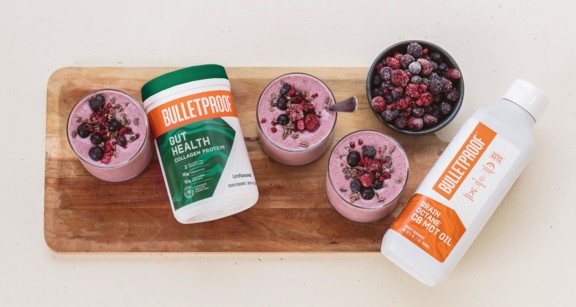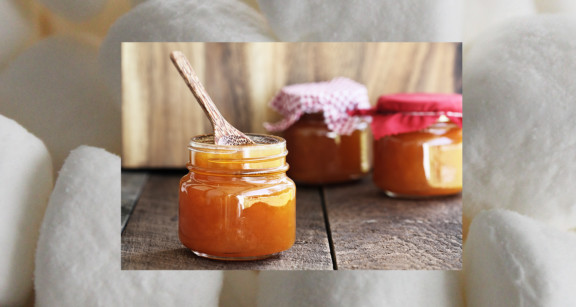Probiotics
What are probiotics? You’ve probably heard of probiotic foods and probiotic supplements. Yet, the benefits of probiotics are not always clear, and the effects can vary from person to person. Plus, the quality, potency and strains of probiotics all contribute to their efficacy. We’re going to take a deep dive into the world of probiotics to help you better understand what they can and can’t do.
There isn’t a one-size-fits-all answer to probiotics. But many people may find them beneficial for various health conditions, especially women. In fact, probiotics for women can potentially help with constipation and bloating.1 And as we’ll explore, probiotics not only affect your gut but can go so far as to affect your mental health.
Discover everything you need to know about probiotics in this deep dive. We’ll go over the benefits of probiotics, recent scientific studies and ways you can incorporate them into your weekly meal planning. If you’re considering adding probiotic supplements to your daily routine, remember to consult your healthcare provider for advice, especially if you have underlying health conditions.
What Are Probiotics?
Probiotics are live microorganisms that may provide health benefits when taken in the right amount. They are often referred to as “good” bacteria. They can have positive effects on your digestive system and gut health. Probiotics exist in certain foods and dietary supplements.
The most common types of microorganisms used as probiotics include various strains of bacteria. Some of the most well-known probiotic bacteria belong to the genera Lactobacillus and Bifidobacterium. These bacteria already live in your gut and may help maintain a balanced and healthy gut microbiota. Having a diversity of “good” bacteria contributes to proper digestion, immune function and other aspects of well-being.2
Different strains of bacteria within the same species can have varying effects. Some strains have been extensively studied and shown to provide specific benefits. Others may not have the same proven effects. Choose a supplement with well-known strains for the specific health benefits you’re seeking. Check the label for detailed information about the strains and their intended effects.
Benefits of Probiotics
There are many potential benefits to consuming probiotics. They support your body in a surprising number of ways, from your mind to your gut. Remember, the effects of probiotics vary from person to person. But the following are possible positive outcomes you may encounter from consuming them.
Better Digestion
Probiotics can help maintain a balanced gut microbiota. This is essential for efficient digestion and absorption of nutrients.3 The effects of probiotics on digestion can vary depending on the specific strains of bacteria, your gut microbiota composition and overall health.
Improved Immunity
A significant part of the immune system is located in the gut. Probiotics may play a role in supporting immune function. They influence the balance of immune cells and promote the growth of beneficial bacteria.4 While probiotics can contribute to immune support, they are not a replacement for a healthy lifestyle. A balanced diet, regular exercise and adequate sleep are also important.
Improved Mental Health
Emerging research suggests a connection between the gut and brain, often referred to as the "gut-brain axis."5 The gut-brain axis is a bidirectional communication network between the gastrointestinal system and the central nervous system. It involves various pathways, including neural, hormonal and immune interactions. Probiotics can influence this axis by affecting the gut microbiota and producing bioactive compounds that can impact brain function. Probiotics can potentially reduce symptoms of conditions like anxiety and depression.6
Healthy Skin
By promoting a balanced gut microbiome, probiotic supplementation may indirectly benefit skin health. A balanced gut microbiome can soothe inflammation associated with certain skin conditions.7 Additionally, a healthy gut can improve the metabolism of certain skin-friendly nutrients.8 It's important to note that while there is promising research suggesting a link between probiotics and skin health, the field is still evolving. Eating a balanced diet, hydrating, exercising and practicing good skincare is essential for supporting skin health alongside any potential probiotic supplementation.
Remember that there are many benefits of probiotics, but not all strains have the same proven effects. It’s important to choose a probiotic supplement with strains that have been studied for the specific health benefits you’re seeking.
The Science-Backed Benefits of Probiotics
Scientists continue to explore exciting research on probiotics in the fields of microbiology, nutrition and medicine.
A recent study has shown that probiotics can help treat constipation by changing the gut microbiota.9 In this case, probiotics provided occasional constipation relief to research subjects. Probiotics could potentially be an alternative treatment to over-the-counter laxatives.
Another fascinating study claims that probiotics could positively affect the gut microbiome as a complementary treatment for neurological disorders. Researchers explored how probiotics can ease symptoms of central nervous system diseases through their inflammatory-soothing properties and the production of neurotransmitters.10 The positive effects of probiotics even led to them being referred to as “psychobiotics.”
Probiotics can also be an especially interesting supplement for athletes, according to the International Society of Sports Nutrition.11 Some of the listed benefits from the study include improved recovery from muscle damage due to specific strains of inflammatory-soothing probiotics. Plus, probiotics may help athletes absorb key nutrients such as amino acids from protein, which can benefit their performance.
While researchers have made a lot of progress in understanding probiotics and their potential benefits, the field is evolving. The effects of specific strains, dosages and durations of probiotic supplementation for different health conditions are areas of interest that researchers continue to explore today.
The Bulletproof Approach to Probiotics
As with all our other supplements, we only use high-quality, clean ingredients for our probiotics. None of our products include GMO, gluten, soy or artificial fillers. We choose science-backed ingredients inspired by traditional wisdom to provide premium products you can trust. We developed a unique blend of prebiotics, probiotics and postbiotics to help you on your journey to better gut health.
Prebiotics, Probiotics and Postbiotics
Our probiotic supplement is a synergistic solution that includes postbiotics, prebiotics and probiotics. They complement each other in supporting healthy digestion and thriving gut microbiome. But what’s the difference between the three?
Probiotics introduce new strains of beneficial bacteria in the gut. This enhances the diversity and balance of the microbiome. We chose the Bifidobacterium lactis strain because it’s the most well-researched and it is shelf stable.
Postbiotics are the metabolic byproducts produced by probiotic bacteria during their fermentation process. They include various compounds such as short-chain fatty acids, enzymes, peptides and organic acids. In our supplement, we’ve added the postbiotic Tributyrin to help speed up relief from digestive discomfort.
Prebiotics are non-digestible dietary fibers and compounds that feed the good bacteria in your gut and fight the growth of bad ones. They provide nourishment for probiotics to help them multiply and thrive.
This powerful trio works together to support your microbiome for immediate relief from digestive discomfort and long-term gut health. Although you can find probiotics, postbiotics and prebiotics in food, it can be challenging to take the appropriate quantities you need to meet your health needs. Our all-in-one supplements help you get the most out of your probiotics in a convenient and easy-to-take format.
Our Supplement Testing Standards
All our products undergo strict testing processes to provide you with the highest quality. We examine all ingredients, from sourcing to the finished product. To choose the most accurate ingredients and dosages, our team of experts study the latest research published in peer-review journals.
We strive for optimal potency and efficacy of our probiotic supplements. We work with third-party labs to test for appropriate levels of active ingredients. They hold our products to FDA regulation standards for composition and strength. Every supplement production undergoes a physical and chemical examination to guarantee consistent quality. Working with third-party labs provides us with unbiased and accurate results.
Our probiotic supplements undergo four layers of quality testing. First, we look at the potency of the ingredients to ensure they aren’t diluted. Then, we make sure the product is pure, without any traces of harmful contaminants. After that, we test that the product has the right amount of active ingredients, as stated on the label. And finally, we do composition testing to ensure that the supplement meets all the label specifications. We hold our products and their testing to the highest standards.
Recipes for Probiotic Foods
Enjoy the benefits of probiotics by preparing some of our most popular probiotic-rich recipes. We’ve rounded up delicious meals, snacks and drinks that include some of our convenient add-ins, like collagen protein powder with probiotics.
Learn More About Probiotics
Probiotic Articles
Why Prebiotics Are More Important Than Probiotics for Your Gut
Move Over Probiotics. Synbiotics Are the Gut Supplement You Need
Inside Bulletproof: You Already Know About Prebiotics and Probiotics—Time to Meet Postbiotics
How to Improve Gut Health and Support Your Microbiome
Gut Health & Sleep: 6 Ways to Support Your Microbiome for Better Rest
FAQs
In general, probiotics are considered safe for most healthy individuals when taken as directed. They are naturally occurring microorganisms that live in the human gut and in various foods. If you are taking medications, especially immunosuppressive drugs or medications for a serious health condition, it’s best to speak to your healthcare provider before starting a probiotic supplement.
First determine what health benefits you want and which probiotic strain can have the desired effect. Choose a supplement that comes in packaging designed to protect the bacteria, such as dark glass bottles or blister packs. Look for supplements that are third-party tested for quality and purity.
Both probiotic supplements and probiotic foods can be effective sources of beneficial bacteria. But probiotic supplements are an easy way to get specific strains of bacteria in controlled doses.
The relationship between probiotics and weight loss is not clear. While probiotics might have a modest effect on weight management, the results are not definitive.12 If you want to take probiotics for weight loss, ask your healthcare provider.
Yes. In fact, taking probiotics every day while on antibiotics may prevent antibiotics-caused diarrhea.13 Take them a few hours apart to prevent the antibiotics from killing off the good bacteria in your probiotics. Taking probiotics helps replenish beneficial bacteria in your gut for better digestive health.
It varies. Follow your healthcare provider’s recommendations or the supplement’s label for instructions. Taking probiotics at the same time every day can help you establish a consistent routine. For you, that may be in the morning or before going to bed.




